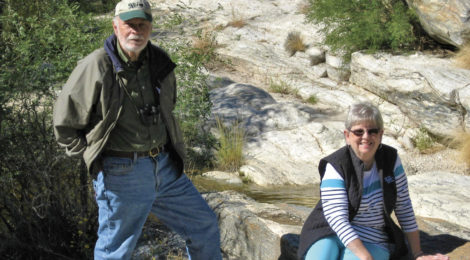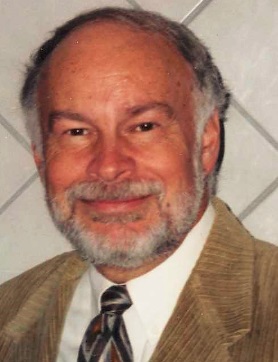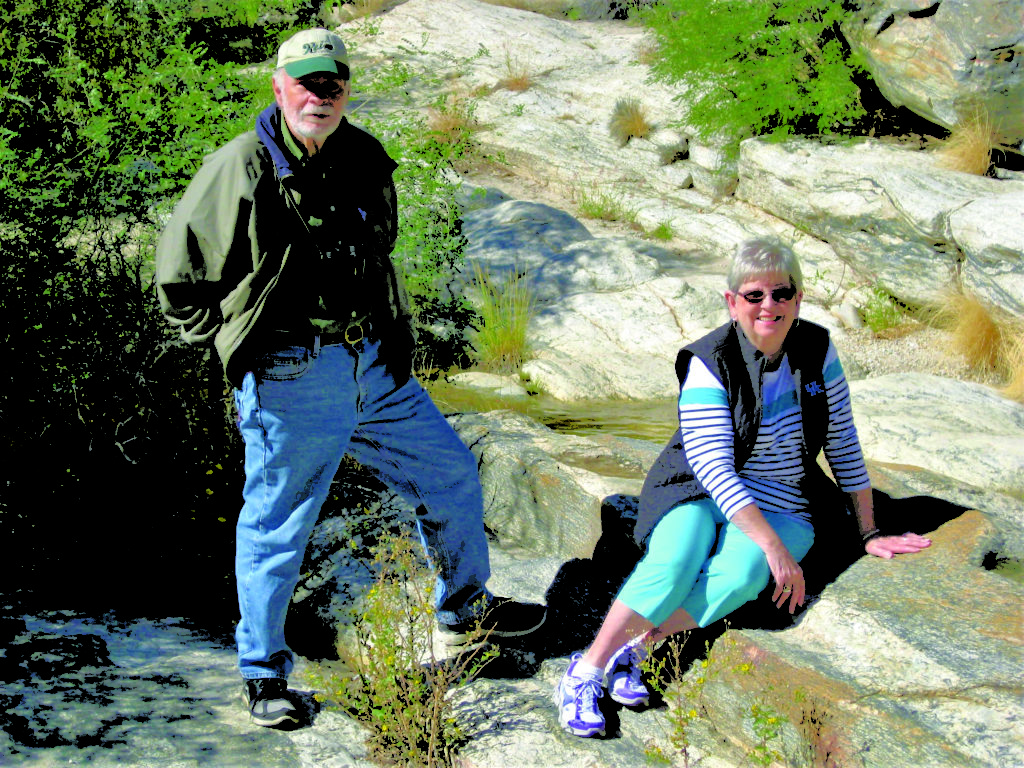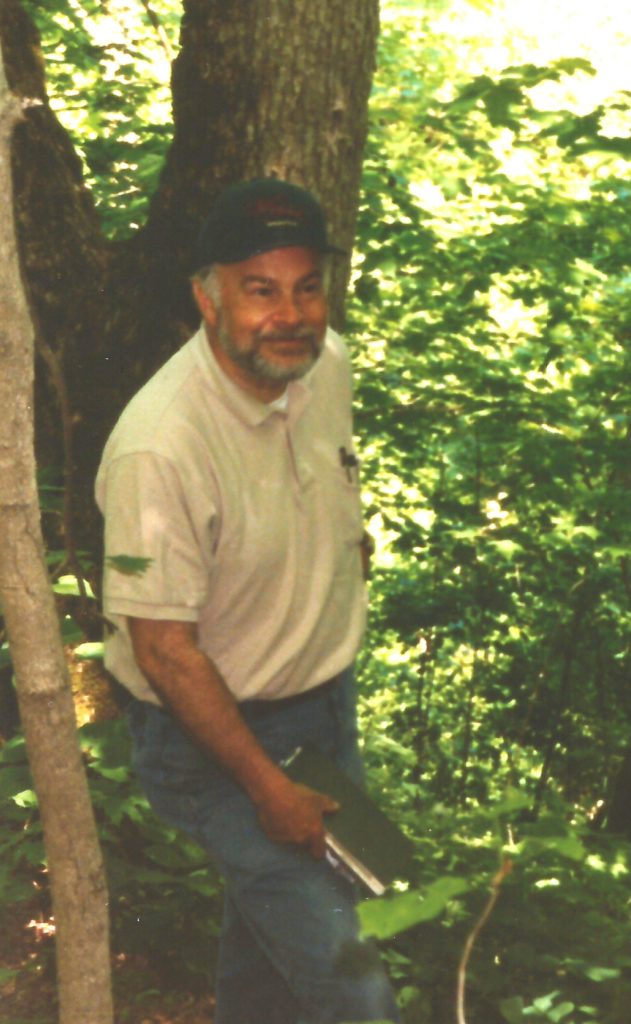
A Tribute to Professor William S. Bryant (1943 – 2019)
Thomas More University Department of Biology – Professor, Advisor, Scientist, Scholar, Mentor, Old Friend

Written in memory by Shannon Galbraith-Kent, Ph.D., with John & Jodi Ferner
Shared at his Celebration of Life Service (September 8, 2019) in Lawrenceburg, Kentucky
I. “What is a Seed?” Any student of Dr. Bill Bryant had this question asked in many ways over the years. The trick in the question was that there was no simple answer, and that the concept applied to more than just plants. By asking the question, he taught us the three components of seeds: inside was the embryo – the new life waiting to develop; along with a food source providing nutrients until it germinated; and an outer covering for protection when needed.
This idea of possibilities within a simple seed also illustrated his ideas of what mattered as a teacher, colleague and lifelong learner: nurturing and providing opportunities for others – for students, colleagues, and those in the community. These were the seeds that Dr. Bryant sowed – and he knew that it takes love for a seed to germinate and grow.
II. In the late 1970s, Dr Bryant was asked to define “loving” for a Thomas More alumni publication. He wrote: “Loving is opening yourself up and letting your heart say “hello” to the world. Loving is the art of giving and receiving love. It’s a caring; a sharing; a believing; and an attempt at understanding. It isn’t always easy. It’s accepting others – warts and all. Loving is thinking kind thoughts, sharing tender moments and remembering good times; it’s thinking of others and not always of ourselves. Loving is what makes us whole.”
How do we measure the life of Dr. Bryant? We measure it as he did – we measure it in love.
He understood this with true clarity. He had a love for his students and colleagues; a love of teaching; of forests, natural history and biology; of books and knowledge; of community and friends; and love of his dear wife Barbara, Ronda, Chris, and their family.
III. He loved his colleagues – and they loved him. It was August 1971 on the campus of Thomas More College in northern Kentucky, a new academic year was starting, and a junior biology professor, Dr. Bill Bryant, was brand new on the faculty. With a young family, he was also finishing his dissertation from Southern Illinois University on ecological research he had done at Panther Rock. This was the beginning of a career that was more impactful than we can fully describe today.
In a few short years, Dr Bryant developed a strong reputation as a rising star – a gifted scholar and teacher, he also had a passion for organizing and leading local conservation efforts. The resident botanist and forestecologist at Thomas More, Dr. Bryant taught a variety of courses during his tenure from Ecology and Botany, to Invertebrate Biology and Aquatic Biology. Because of his broad background, curiosity, and deep intellect, he could teach anything – and could do it well, including teaching a course for the History Department on the History of Kentucky.
At the same time, he was also known as an exemplary colleague. In their own words, he has been described as “the consummate scholar” – an excellent teacher and talented researcher, “gentle scientist,” “mentor,” “gentleman” “very talented” and the most sincere, warmest, most outgoing person you would ever meet and, “dear friend.” Dr Bryant’s relationship with his colleagues was also such a strong and enduring part of who he was. An example of this is his decades-long personal and professional relationship with Dr. John Ferner. When the two of them were seen together, a colleague from another department would refer to them as – “the Brothers Biological.”
A role model for so many of his peers, Dr. Bryant was able to maintain a balanced and productive life with the partnership of his wife, Barbara. He was not only an excellent teacher and mentor to both students and colleagues, but gave priority to his family, nurtured them, and developed strong traditions. Dr. Bryant also found time to serve his larger communities in local schools, boards of organizations, and elected positions in societies. Yet he did all these things at a steady, self-assured pace and – in the words of Dr. Ferner, “he always had time to stop and be present to those in his universe.”
In the last month, another colleague wrote that the, “kindness, compassion and attention he gave his students was also extended to all of his colleagues. If all of us were to live that same way, we would think we had created a real Utopia.”
As a scientist, Dr. Bryant maintained an active research program unlike any seen before in the sciences at Thomas More. And it was not just the scores of publications that he generated that in itself was impressive, but the number of citations his contributions continue to have in the scientific literature on the natural history of our region reflect his true, lasting influence. While educating students, Dr. Bryant successfully led the Biology Department as Chair for many years. His leadership on college committees had at its heart the pursuit of the excellence established by his predecessors, and Thomas More is better because of his academic integrity.

IV. He had a Love of Students—and we loved him. Remembered by a large number of alumni in these past few weeks, we called him, “Teacher”, “Advisor”, “Father-figure”, “Friend”, “Mentor”, “Advocate.”
While he was known to be very challenging in class, Dr. Bryant had an open-door policy. ALWAYS. He made time. Just for you. ALWAYS. The relationships, trust, and respect formed during those office visits and “doorway conversations” showed us time and again how much he cared for us. And we loved him for that.
One of his long-time friends and faculty colleagues, Dr. Siobhan Barone, commented on his exceptional way of interacting with students: “Dr. Bryant just intuitively knew what any given student needed – a firm, but kind, reality check on life or maybe just some gentle encouragement.” She saw him act as an advisor, parent, and cheerleader for students over the years – and the guidance he gave them on difficult decisions has led to so many fulfilling, rewarding lives.
Many alumni have recently shared reflections on Dr. Bryant’s enduring impact, including:
“he taught me not just about biology, but how to approach and solve problems, how to think critically, and how to be a good person…”
“Dr. Bryant was one in a million. He cared about us, his students, and I think we all had a special bond with him over the years remembering his passion for teaching, his encouragement, and his smiling face…”
“Not only did he guide us through our studies, he guided us through our lives. …he was constantly demanding the best out of you in the classroom …. He cared for his students like they were his children…”
Ecologist Robert MacArthur said, “Science is the observation of patterns.” Dr Bryant often quoted this, and it fits him. Dr. Bryant’s perceptive abilities were remarkable – not only as an ecologist, but as a teacher and as a human being. When a first-year student was frustrated and trying to figure out why she kept getting lower exam grades than hoped, she confided in him that she didn’t understand why her scores weren’t better. He said – “after the first exam, I can predict within a few points what a student will get on their remaining exams and their final course grade. Students get into study patterns and don’t often change their habits.” And his next statement changed my approach to learning – he said, “you’re studying to get an 80 percent. You need to change your habits and prepare as if you’re trying to get a 100 percent.”
I did what he suggested – and he was right. That one comment on a Tuesday afternoon in March 1995 changed my whole outlook on how seriously I was taking my training as a young biologist. He helped increase my confidence – and it changed my life forever.
This story is certainly one that was replicated over decades – providing this encouragement to so many of his students.
For the thousands of students he served, the hundreds of classes he taught, and the long list of subjects he mastered along the way – Dr. Bryant placed such a high value on knowledge, learning, and critical thinking – yet it was his mentoring that changed so many of our lives – not only in our career paths – but in nurturing personal qualities of integrity, trust, and meaningful relationships.
His love for his students was shared in so many ways – and we are eternally grateful.
V. He had a Love of nature – and so many people loved learning from him. Being on a class hike or doing forest research with Dr. Bryant was truly special. Other than being with his family, if you wanted to see him full of joy – this is a place you’d find it. He would always say, “well, we’re going out to see some Old Friends” – and by friends, he meant the various wildflower species – which return each year, many in the same locations, to bloom and greet us. His connection to the natural environment, and sharing that with his students, was an incredible teaching gift. He knew EVERYTHING! There was in him an urgency to share this knowledge – and a pure excitement in wanting you to know – about things like the KY Coffeetree, and how glaciers helped shape Northern KY, and how forest slopes affected which trees were located where. When he said, “You’ve got to know these things” – you knew that he meant it. That whatever he was sharing was Important. His ability to bring-in funny stories or sing songs that referenced the Pokeweed plant – this and other Dr. Bryant-isms made life exciting, fun, and memorable…
And we DO remember these things. As one alumnus wrote, “Dr. Bryant fostered my love of the outdoors and gave me such a deep appreciation for nature – and I’ve worked hard to pass that legacy onto my children.” Whether by visiting Boone Cliffs Nature Preserve which he helped to conserve while leading the local chapter of The Nature Conservancy, or the Dinsmore Estate, or any number of other beloved spots, his love for the environment, for the natural history of Kentucky, for wanting to conserve and share these areas with others – this lives on through so many of us.
In 2013, we had Dr. Bryant back to Thomas More to lead a tree walk through the William S. Bryant Arboretum – named in his honor in 2008 by his colleagues. Alumni from across several decades came just to see him. I talked with several of them who had had him in class in the early 1980s and they said – “we just wanted to be his student again… we came because we wanted to hear and learn from him just one more time.”
VI. After Dr. Bryant passed away, Barb found a small piece of paper that he had kept neatly folded into a square in his pocket – along with his KY Coffeetree seed and a few other items he was known to carry. And we think he might have written it around the time he retired. It reads in its entirety: “When I came to TMC in Fall 1971, I didn’t know how long I’d stay. 37 years later, I was still here. Why? Did I influence others or did others influence me? My colleagues, Dr. Fred Humphreys, Sr. Mary Laurence, Mr. Bill Volker, Dr. John Ferner, Dr. Siobhan Barone, Dr. Chris Lorentz, Dr. John Hageman, and many others showed me the traits, dedication and love for students. My students probably influenced me more than I did them; I watched them grow, achieve goals, succeed, and fail. I remember them and I am most pleased that they remember me in kind ways. I tried to set a good example. Others had influenced me.”
How do we measure the life of Dr. Bill Bryant? We measure it in love. An immense love in which he shared, led, and fully experienced life with others – leaving this world a much better place.
So, when you are out, and recognize a plant that you have seen before, you can say, “Hello, Old Friend” – and know that Dr. Bryant is also nearby.
We will love you forever, Dr. Bill Bryant.


Comments are closed, but trackbacks and pingbacks are open.